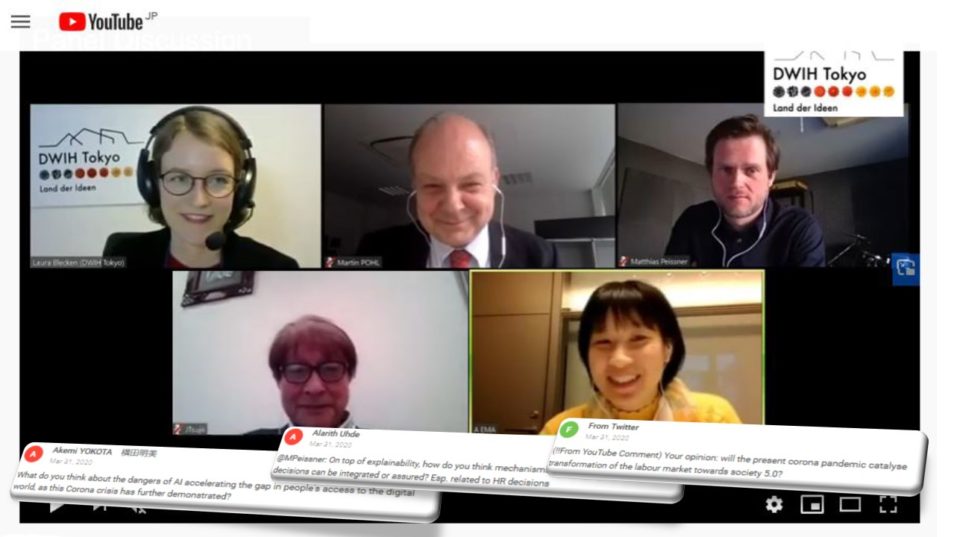The Future of Work in Industry 4.0 & Society 5.0
 © DWIH Tokyo
© DWIH Tokyo
On 31 March, the DWIH Tokyo welcomed four panellists to its very first event held completely online. The interactive web talk enabled those watching to participate in the panel discussion by posting questions and comments. More than 150 viewers from Germany and Japan followed the web talk via the live stream on YouTube.
The first talk was given by Dr Martin Pohl, Counsellor, Labour and Health Affairs, Embassy of the Federal Republic of Germany in Tokyo. In his presentation about “Political Roadmaps and Management Challenges for the Work of the Future in Industry 4.0 and Society 5.0”, he explained the background to concepts of future work in Germany and Japan. He argued that despite different political approaches, the outcomes in both Germany and Japan are likely to look similar. Next, Dr Matthias Peissner from the Fraunhofer Institute of Industrial Engineering spoke about “AI and Work – How We Can Shape the Collaboration between Man and Machine”. He presented practical examples of how human intelligence and artificial intelligence (AI) are interacting in German research projects. Dr Peissner also referred to the EU guidelines on trustworthy AI, emphasizing that for the EU it is paramount not to abandon the discussion on ethics within the wider topic of AI.
The third speaker was Prof. Dr Junichi Tsujii, Director, Artificial Intelligence Research Center (AIRC), AIST Japan, with his talk about “Co-existence, Co-operation and Co-evolution between AIs and Humans”. He provided insights into how the co-operation of AI and humans is conceptualized in Japan, referring to research projects at the AIRC. The presentations were rounded off by the fourth speaker, Prof. Dr Arisa Ema from the Institute for Future Initiatives of the University of Tokyo. By asking “Ethical Questions Concerning the Collaboration of Human and Artificial Intelligence in Society 5.0”, her talk took a closer look at the human side of the future of work. While she argued that AI is unlikely to entirely replace human jobs, she drew attention to the immense changes the development of AI will bring, leading to the fundamental question of the kind of society in which we want to live.
The presentations were followed by a 40-minute Q&A session, moderated by DWIH Tokyo program manager Laura Blecken. The audience’s questions covered the different ethical approaches of Japan and Germany in general, as well as concrete issues of data security, the prevention of job losses and widening social gaps due to economic inequality. The question of how the current Covid-19 pandemic impacts the future of work in our countries was also brought up, as changes in our work environment and in society have never been so rapid and so easily observable as now.
Live Stream: https://www.youtube.com/watch?v=QgVCjulSXLY
Report: Jan Robin Sofinowski (DWIH Tokyo intern)
